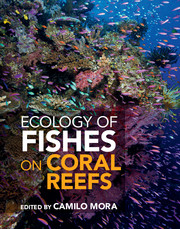Book contents
- Frontmatter
- Contents
- Preface
- Foreword
- List of contributors
- PART I BASIC ECOLOGY
- PART II PATTERNS AND PROCESSES
- PART III HUMAN FINGERPRINTS
- PART IV CONSERVATION
- PART V DEBATES AND PARADIGM SHIFTS
- 23 Is dispersal of larval reef fishes passive?
- 24 Density dependence and independence and the population dynamics of coral reef fishes
- 25 Equilibrial versus non-equilibrial dynamics in coral reef fishes
- 26 Cryptic density dependence: integrating supply-side ecology with population regulation
- 27 Priority effects
- 28 Inverted trophic pyramids
- 29 Shifting baselines in coral reef fishes
- 30 Pluralism explains diversity in the Coral Triangle
- 31 Reef fish biogeographical regions
- 32 Size and sex change
- 33 Quantifying reef fishes: bias in observational approaches
- 34 Seascape ecology of fishes on coral reefs
- 35 The future for coral reef fishes
- 36 Perpetual struggle for conservation in a crowded world and the needed paradigm shift for easing ultimate burdens
- References
- Index
35 - The future for coral reef fishes
from PART V - DEBATES AND PARADIGM SHIFTS
Published online by Cambridge University Press: 05 May 2015
- Frontmatter
- Contents
- Preface
- Foreword
- List of contributors
- PART I BASIC ECOLOGY
- PART II PATTERNS AND PROCESSES
- PART III HUMAN FINGERPRINTS
- PART IV CONSERVATION
- PART V DEBATES AND PARADIGM SHIFTS
- 23 Is dispersal of larval reef fishes passive?
- 24 Density dependence and independence and the population dynamics of coral reef fishes
- 25 Equilibrial versus non-equilibrial dynamics in coral reef fishes
- 26 Cryptic density dependence: integrating supply-side ecology with population regulation
- 27 Priority effects
- 28 Inverted trophic pyramids
- 29 Shifting baselines in coral reef fishes
- 30 Pluralism explains diversity in the Coral Triangle
- 31 Reef fish biogeographical regions
- 32 Size and sex change
- 33 Quantifying reef fishes: bias in observational approaches
- 34 Seascape ecology of fishes on coral reefs
- 35 The future for coral reef fishes
- 36 Perpetual struggle for conservation in a crowded world and the needed paradigm shift for easing ultimate burdens
- References
- Index
Summary
Complex, high diversity fish communities have assembled around coral reefs for 50 Ma, contributing to the complexity of this most elaborate of all marine ecosystems. These fish play important ecological roles in the reef ecosystem, serve as vital food resources for coastal populations, and provide one of the chief attractions offered by reefs to tourism. However, reef fish assemblages are now at some risk because of widespread overfishing and other human impacts on their environment. Our knowledge of the degree to which reef fish species are tied to reefs is limited, but studies of the aftermath of losses of coral due to mass bleaching reveal that many fish species are affected in diverse ways. Those that decline tend to be corallivores, or species which use live coral as shelter sites. Species using stimuli provided by corals to guide settlement following larval life may also be affected. Reef fish species may also be affected directly by warming and acidification caused by our greenhouse gas emissions. While the good news is that many reef fish species should be able to survive in a world with fewer coral reefs, the bad news is that the communities they will form seem certain to be diminished compared to those on reefs today. The irony, of course, is that we already understand the causes, and how to avoid or to remedy the consequences. We should be able to retain much of the abundance and diversity of fishes now occupying coral reefs. Yet our chronic past failure to address simple stressors like overfishing raises the wider question of what it will take to get us to redress the profound stresses we are now imposing on the biosphere which sustains our own lives.
The first attempts to review our ecological knowledge of coral reef fishes were papers by Ehrlich [744], Goldman and Talbot [947], and Sale [2226].
- Type
- Chapter
- Information
- Ecology of Fishes on Coral Reefs , pp. 283 - 288Publisher: Cambridge University PressPrint publication year: 2015
- 1
- Cited by



